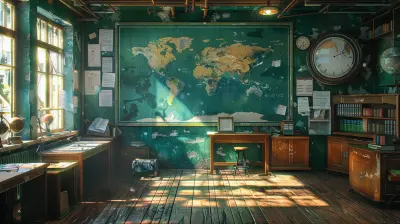The Role of Curiosity in Developing New Skills
1 June 2025
Have you ever thought about what drives people to learn new skills? Is it motivation? Passion? Or maybe even necessity? While all these factors play a role, there's something else that often gets overlooked—curiosity. Curiosity is like the fuel that powers the engine of learning. Without it, we’d probably stick to what we already know and never venture into new territory. But with curiosity? The sky's the limit.
In this article, we're diving deep into the role curiosity plays in developing new skills. We'll explore why curiosity is essential, how it works, and what you can do to nurture it in yourself. Ready to dig in? Let’s go!
What Exactly Is Curiosity?
Before we get into the nitty-gritty, let’s define curiosity. At its core, curiosity is the desire to know more about something. It's that itch in your brain that needs to be scratched by new knowledge or experiences. Whether it's learning how to play a musical instrument, mastering a new language, or exploring a hobby like photography, curiosity is the driving force behind that initial spark of interest.Curiosity Is Not Just for Kids
Often, when we think of curiosity, we picture a child asking a million questions about the world. Why is the sky blue? How do birds fly? But curiosity isn’t just for kids. In fact, adults can (and should!) embrace their curiosity just as much. It’s something that’s with us throughout our lives, though we sometimes need to rekindle it.
Why Curiosity Matters in Skill Development
Curiosity isn’t just a quirky personality trait—it’s a key ingredient for effective learning. Here’s why:1. It Encourages Exploration
When you're curious, you're more likely to explore new areas of interest. This exploration is the foundation of learning. For example, maybe you’ve always been curious about cooking. You start by watching cooking videos, then you try out a few recipes, and before you know it, you’re hosting dinner parties!By exploring, you're gathering bits and pieces of information, which eventually come together to form a new skill. Curiosity is like a compass, guiding you through the unknown and pointing you toward what you need to learn next.
2. It Boosts Your Motivation
Let’s face it: learning new skills can be hard work. But when you’re curious, it doesn’t feel like a chore—it feels like a quest. Think of curiosity as your personal cheerleader. It keeps you motivated even when things get tough. You’re not just learning because you have to; you’re learning because you want to. That makes a huge difference.Take learning a complex skill like coding. If your curiosity is driving you, you'll be more inclined to push through the initial frustration. You’ll keep at it because you’re genuinely interested in how things work. It’s like solving a puzzle, and curiosity is what keeps you moving forward.
3. It Enhances Problem-Solving
Curiosity and problem-solving go hand in hand. When you’re curious, you're more likely to ask questions, look for different solutions, and think outside the box. This is critical when learning new skills, especially those that require creativity or technical precision.For instance, if you’re learning to play the guitar and you can’t quite nail a particular chord, curiosity will push you to figure out different finger placements or techniques. Instead of giving up, you’ll be eager to solve the problem.
4. It Facilitates Deeper Learning
Curiosity doesn’t just encourage you to learn superficially; it drives you to dig deeper. When you're curious about something, you're more likely to go beyond the basics and seek a comprehensive understanding. This leads to mastery rather than just competence.Let’s say you’re learning photography. Basic curiosity might drive you to learn how to use a camera, but deeper curiosity will make you explore lighting techniques, composition, and editing software. This deeper dive turns you from a casual hobbyist into someone with a real skillset.
How Curiosity Impacts the Brain
Curiosity doesn’t just make learning more enjoyable—it has a measurable impact on your brain. When you're curious, your brain releases dopamine, the "feel-good" neurotransmitter. This not only makes you feel more satisfied but also strengthens your memory. In short, curiosity helps you retain information better.The Brain's Reward System
You know that rush you get when you solve a problem or learn something new? That’s your brain rewarding you for satisfying your curiosity. This reward system is crucial for skill development because it keeps you coming back for more. Essentially, your brain is giving you a high-five every time you learn something new.
Ways to Foster Curiosity for Skill Development
We’ve established that curiosity is essential for learning, but how do you actually cultivate it? Especially if you feel like your curiosity has been stifled over the years? Here are some strategies to help you rekindle that spark.1. Ask More Questions
Remember when we talked about kids being naturally curious? One of the reasons they learn so much is that they ask questions—a lot of questions. You can do the same. Don’t be afraid to ask "why" or "how." When you're learning something new, probe deeper. Why does it work this way? How can I do it better? The more questions you ask, the more curious you'll become.2. Embrace the Beginner’s Mindset
As adults, we often feel the pressure to be experts, but this can actually stifle curiosity. Instead, adopt a beginner’s mindset. Be open to learning new things, even if you’re not good at them right away. In fact, curiosity thrives when you admit that you don’t know everything, and you're willing to explore the unknown.3. Expose Yourself to New Experiences
Curiosity doesn’t develop in a vacuum. You have to feed it by exposing yourself to new ideas, people, and environments. Try new activities, read different genres of books, or even travel to unfamiliar places. The more you experience, the more opportunities you’ll have to spark curiosity.4. Embrace Failure as a Learning Tool
Fear of failure is one of the biggest blockers of curiosity. If you're too afraid to fail, you won’t take risks, and your curiosity will wither. Instead, see failure as part of the learning process. Each mistake is an opportunity to grow, and curiosity will help you see failure as a stepping stone rather than a roadblock.5. Set Small Challenges for Yourself
Curiosity loves a challenge. By setting small, achievable goals, you give your curiosity something to focus on. For example, if you’re learning to play chess, challenge yourself to learn one new strategy each week. These incremental challenges will keep you engaged and eager to learn more.The Role of Curiosity in Lifelong Learning
Curiosity isn't something that should be confined to school or formal education—it’s a lifelong asset. Whether you're 20, 40, or 80, curiosity can help you continue growing and developing new skills. Lifelong learners are typically those who have maintained their sense of curiosity throughout their lives.In today’s fast-paced world, where new technologies and industries are constantly emerging, curiosity can give you a competitive edge. It allows you to adapt, stay relevant, and continue learning well beyond formal education.
Curiosity in the Workplace
In a professional setting, curiosity can be a game-changer. Employers are increasingly looking for individuals who are adaptable and eager to learn. When you're curious, you're more likely to innovate, solve problems, and contribute new ideas. This makes you a more valuable asset to any team or organization.Conclusion: Curiosity As Your Superpower
Curiosity is more than just a fleeting feeling—it’s a powerful tool for personal growth and skill development. It encourages exploration, boosts motivation, enhances problem-solving, and drives deeper learning. Whether you’re picking up a new hobby, advancing in your career, or just trying to learn something new for fun, curiosity is the key that unlocks your potential.The best part? Curiosity is something you can always cultivate and nurture, no matter your age or background. So go ahead—let your curiosity guide you! Who knows what new skills and knowledge you’ll discover along the way?
all images in this post were generated using AI tools
Category:
Skill DevelopmentAuthor:

Madeleine Newton
Discussion
rate this article
3 comments
Yvonne McPhee
Curiosity drives skill development and innovation.
June 19, 2025 at 3:31 AM

Madeleine Newton
Absolutely! Curiosity fuels our desire to explore and learn, leading to enhanced skills and innovative breakthroughs.
Clover Price
Curiosity drives innovation and enhances skill acquisition effectively.
June 13, 2025 at 3:22 AM

Madeleine Newton
Absolutely! Curiosity is a powerful catalyst for innovation and skill development, fueling our desire to explore, learn, and grow.
Ezra Potter
I love this perspective on curiosity! It’s amazing how asking questions and exploring new ideas can open up so many opportunities for growth. Embracing our natural curiosity really does make skill development much more enjoyable!
June 4, 2025 at 11:33 AM

Madeleine Newton
Thank you! I'm glad you resonate with the idea that curiosity fuels growth and makes skill development a more enjoyable journey.



